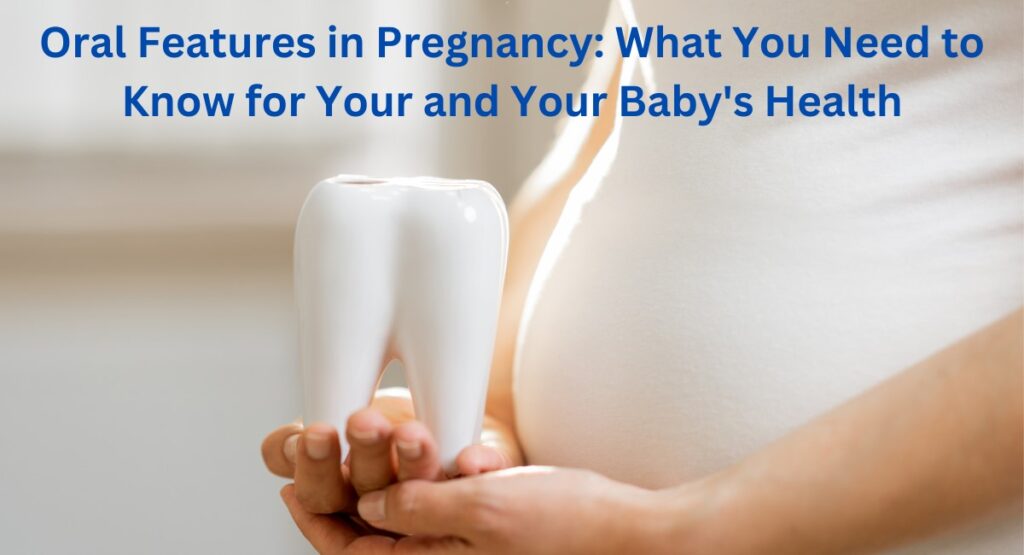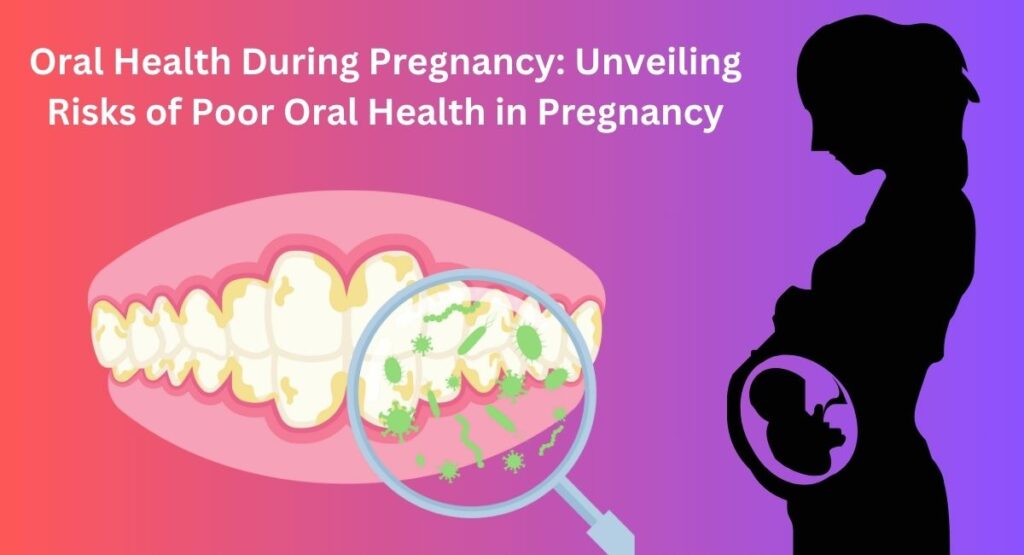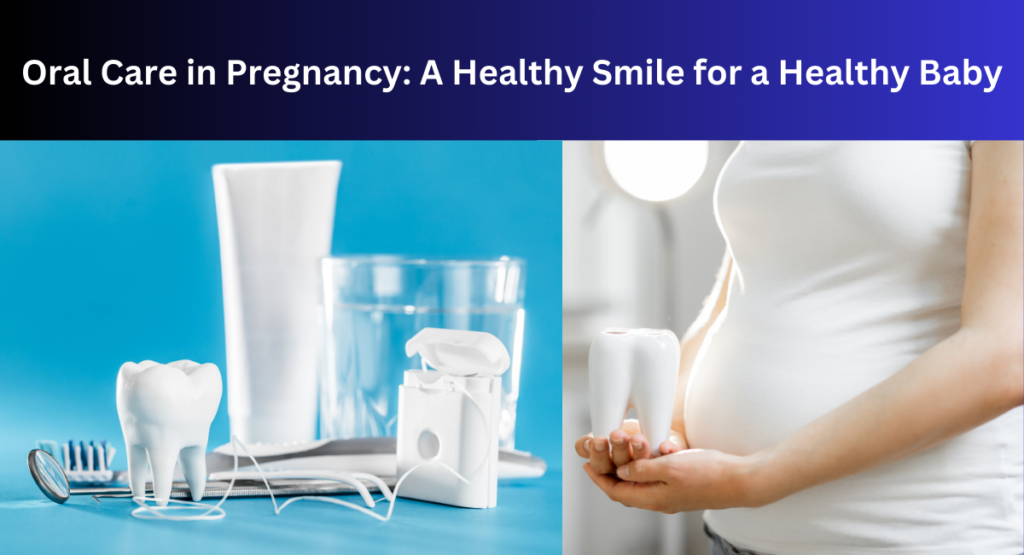
Oral Features in Pregnancy What You Need to Know for Your and Your Baby’s Health
Pregnancy is a wonderful journey, brings many changes, not just to the body but also to oral health. These changes are temporary, like shifts in hormones and metabolism, and usually go back to normal after the baby is born. During this time, the mouth can be more sensitive to infections and irritation, especially if proper oral care isn’t maintained. Studies show that poor oral health is linked to issues in pregnancy like miscarriage and low birth weight. It’s clear that oral health and pregnancy have a strong connection, impacting each other. Understanding the oral changes during pregnancy is vital for taking care of both the mother and the baby.
This article will dive into the oral features in pregnancy, what causes them, their symptoms, ways to prevent and treat them, and important FAQs related to pregnancy and oral health for effective prevention and management – a crucial pursuit benefiting both mother and baby.
What are the Oral changes during Pregnancy?
Pregnancy leads to big hormonal and metabolic changes that affect both oral and overall health. More hormones, like estrogen and progesterone, can increase blood flow to the gums, making them more susceptible to get infected and inflamed. This can cause changes in the mouth and make existing oral infections worse.
Pregnancy Gingivitis
Pregnancy gingivitis is a common gum disease that affects pregnant women. It is caused by changes in hormones and increased blood flow to the gums. Pregnancy gingivitis can cause gums to become red, swollen, and bleed easily. It can also lead to bad breath and tooth loss. With proper oral hygiene care, pregnancy gingivitis may improve or regress after delivery, sometimes even before the delivery.
Symptoms of Pregnancy Gingivitis:
- Red, swollen, and bleeding gums
- Bad breath
- Loose teeth
- Painful gums
Causes of Pregnancy Gingivitis:
- Changes in hormones
- Increased blood flow to the gums
- Plaque buildup
Prevention of Pregnancy Gingivitis:
- Maintain good oral hygiene by brushing and flossing regularly. Explore further on the top oral hygiene practices by delving into “8 Expert Oral Hygiene Tips for a Brighter, Healthier Smile.”
- Regular dental check-ups every three months during pregnancy.
- Consuming a balanced diet and avoiding sugary snacks.
- Rinse mouth after vomiting to remove acids.
- Avoid harmful habits like smoking, using cannabis, and consuming alcohol. These habits don’t just make gum disease worse but are also harmful for both you and your baby. Short-term enjoyment can lead to long-term issues. For guidance on quitting tobacco, refer our article on “how to quit tobacco.”
Treatment of Pregnancy Gingivitis:
- Professional dental cleaning to remove plaque and tartar.
- Use antibacterial, non-alcoholic mouthwash to decrease inflammation. However, it’s advisable to refrain from long-term usage of antibacterial mouthwashes unless recommended by your healthcare professional.
- Using a soft toothbrush and gentle brushing technique.
Pregnancy Tumor (Pregnancy Epulis)
During pregnancy, a gum bump, often known as a pregnancy tumor, can show up as a bump between your teeth. It might seem like a tumor, but it’s not cancer or any tumor. This kind of gum bump typically occurs during pregnancy. It can happen due to poor oral hygiene and constant irritation from hardened plaque called tartar. While it can occur in anyone with poor oral hygiene, it’s more likely during pregnancy when gums are extra sensitive. If proper oral hygiene care is taken, the gum bump may regress after delivery.
Causes of Pregnancy Tumor:
- Hormonal changes during pregnancy, particularly increased estrogen and progesterone
- Poor oral hygiene and plaque buildup
- Chronic irritation from tartar (hardened plaque)
- Increased gum sensitivity during pregnancy
Symptoms of Pregnancy Tumor:
- A benign, red or purple, growth on the gums, usually not painful but may bleed easily.
- Frequently occurs between teeth or near the gum line
- Generally, appears in the second or third trimester and usually disappears after childbirth
Prevention of Pregnancy Tumor:
- Emphasize good oral hygiene practices. Carefully brush your teeth twice a day for two minutes using fluoride toothpaste. Ensure to floss your teeth at least once a day before bedtime.
- Eating a well-balanced diet to support oral health.
- Regular dental visits for early detection and management.
Treatment of Pregnancy Tumor:
- Professional dental examination to confirm the diagnosis.
- Surgical removal if the growth is bothersome or interfering.
- Maintaining good oral hygiene to prevent recurrence.
- Post-pregnancy Re-evaluation if the growth persists.
Tooth Decay during Pregnancy
Dental decay can arise during pregnancy due to frequent snacking triggered by cravings. These cravings often lead to increased consumption of sugary foods or drinks. As a result, the teeth are exposed to more sugars and acids, which, when combined with inadequate oral hygiene, can foster the growth of harmful bacteria. These bacteria generate acids that attack the tooth enamel, causing decay and cavity formation.
During pregnancy, hormonal changes can impact the acidity levels in the mouth, making the teeth more vulnerable to decay.
Symptoms of Tooth Decay during Pregnancy:
- Sensitivity or pain in the teeth.
- Visible holes or pits in the teeth.
- Discoloration or black spots on the teeth.
- Painful swelling or boil on the gums.
Causes of Tooth Decay during Pregnancy:
- Increased snacking or craving for sugary foods.
- Poor oral hygiene practices.
- Hormonal changes that affect the mouth’s acidity levels.
Prevention of Tooth Decay during Pregnancy:
- Maintain a balanced diet, reducing sugary snacks and drinks.
- Brush teeth at least twice daily with fluoride toothpaste.
- Floss daily to clean between teeth and remove plaque.
- Regular dental check-ups and cleanings every three months.
- Avoid snacking between meals, especially sugary foods.
- When you’re feeling hungry between meals, choose snacks like veggies, fresh fruit, or plain yogurt, and steer clear of sugary or acidic foods.
Treatment of Tooth Decay during Pregnancy:
- Dental fillings to repair decayed teeth
- Root canal therapy for more severe cases
- Use of desensitizing toothpaste to alleviate sensitivity
- Maintaining good oral hygiene to prevent further decay
Teeth Erosion during Pregnancy
Teeth erosion can occur as a result of vomiting during morning sickness, particularly due to stomach acid. This acid can gradually wear away the outer layer (enamel) of the teeth, exposing the underlying layers. Once the enamel is eroded, it can cause increased tooth sensitivity, making teeth more prone to pain or discomfort when consuming hot, cold, or sweet foods. Furthermore, erosion also elevates the risk of dental decay by weakening the tooth’s protective outer layer.
Symptoms of Teeth Erosion during Pregnancy:
- Increased tooth sensitivity to hot, cold, or sweet foods
- Discoloration or translucency of the teeth
- Rounded or cupped appearance on the tooth surface
Causes of Teeth Erosion during Pregnancy:
- Repeated vomiting or morning sickness
- Stomach acid eroding the tooth enamel
- Exposing underlying nerves, leading to sensitivity or pain
Prevention of Teeth Erosion during Pregnancy:
- Rinse your mouth with water after vomiting to help neutralize acid
- Wait for about 30 minutes before brushing your teeth after vomiting
- Avoid brushing your teeth immediately after vomiting to prevent further enamel damage
- Consider using a fluoride mouthwash and fluoride toothpaste to strengthen teeth.
Prevention of Morning Sickness:
Preventing morning sickness itself can be challenging, but managing the symptoms to reduce vomiting can indirectly help in preventing teeth erosion. However, here are some tips that might help alleviate the frequency or severity of morning sickness:
- Eating smaller, more frequent meals to avoid an empty stomach
- Avoiding spicy, greasy, or strong-smelling foods that can trigger nausea
- Keeping hydrated by sipping water throughout the day
- Trying ginger-based products or herbal teas, known for their anti-nausea effects
- Getting fresh air or resting to reduce stress and nausea triggers
Treatment of Teeth Erosion during Pregnancy:
- Dental fillings or bonding to restore affected teeth
- Dental crowns for more severe erosion
- Use of desensitizing toothpaste to alleviate sensitivity
- Limiting acidic food and drinks to prevent further erosion
- Seeking professional dental advice for appropriate treatment options
Saliva Changes
Its Significance Pregnancy can cause changes in saliva production, affecting the mouth’s pH balance and increasing the risk of dental problems.
Increased Saliva Production During Pregnancy
Increased saliva production, known as ptyalism, can be quite common during pregnancy, often appearing more noticeably in the first trimester. This excess saliva can lead to constant spitting or drooling, making it uncomfortable for some women. It may result from hormonal fluctuations during pregnancy or can also be a reflex response to feelings of nausea or vomiting.
Symptoms of Increased Saliva Production During Pregnancy:
- Excessive saliva in the mouth, leading to constant spitting or drooling
- Difficulty in swallowing due to increased saliva
- Occurrence more prominently in the early stages of pregnancy
Causes of Increased Saliva Production During Pregnancy:
- Hormonal changes, particularly in the first trimester
- Unconscious response to nausea or vomiting
Prevention of Increased Saliva Production During Pregnancy:
- Eating smaller, more frequent meals to minimize nausea
- Avoiding spicy or greasy foods that might trigger excessive saliva production
- Staying hydrated by sipping water throughout the day
Treatment of Increased Saliva Production During Pregnancy:
- Chewing sugarless gum or sucking on hard candy to help manage excessive saliva
- Using mouthwash or rinsing the mouth frequently to maintain oral hygiene
- Consuming tart or sour foods to help reduce saliva production
- Seeking professional advice if the condition is severe or uncomfortable
Dry Mouth During Pregnancy
During pregnancy, some individuals might experience an increase in salivation, known as ptyalism, while others may encounter dry mouth. These oral changes can vary from person to person and during different stages of pregnancy.
Dry mouth during pregnancy occurs due to hormonal changes that can influence the body’s saliva production. This decrease in saliva can lead to discomfort, making the mouth feel dry and parched. Dehydration resulting from morning sickness, stress, or anxiety can also contribute to this condition.
Symptoms of Dry Mouth During Pregnancy:
- Feeling parched or dehydrated in the mouth
- Difficulty swallowing or speaking due to lack of saliva
- Cracked lips or a dry sensation in the throat
Causes of Dry Mouth During Pregnancy:
- Hormonal changes affecting saliva production
- Increased stress or anxiety
- Dehydration due to nausea, vomiting, or inadequate fluid intake
Prevention of Dry Mouth During Pregnancy:
- Drinking plenty of water throughout the day.
- Using sugarless candies or gums to stimulate saliva production.
- Limiting caffeine intake, which can exacerbate dry mouth.
- Avoid mouthwashes that contain alcohol.
- Maintaining a humid environment to alleviate dryness.
Treatment of Dry Mouth During Pregnancy:
- Sipping water frequently to keep the mouth moist
- Using over-the-counter saliva substitutes or moisturizing gels
- Chewing sugar-free gum or consuming sugarless hard candies to stimulate saliva
- Using a humidifier to add moisture to the air, especially at night
- Cease smoking as it can exacerbate dry mouth. Smoking tobacco is detrimental to your overall health as well as the health of your baby. Read more about how to quit smoking?
Changes in Taste Sensation (Dysgeusia) During Pregnancy
Changes in taste sensation, or dysgeusia, are common during pregnancy, characterized by perceiving unusual tastes in the mouth. Pregnant individuals may experience a metallic, bitter, or sour taste, which can be uncomfortable. This alteration in taste is often more noticeable in the early stages of pregnancy and might vary throughout the term. Hormonal changes, especially in the first trimester, can significantly influence taste perception, and increased blood flow during pregnancy can also contribute to this change.
Symptoms of Changes in Taste Sensation During Pregnancy:
- Perception of unusual tastes, such as metallic, bitter, or sour Flavors in the mouth
- Fluctuations in taste perception, occurring especially in the early stages of pregnancy
Causes of Changes in Taste Sensation During Pregnancy:
- Hormonal fluctuations, particularly in the first trimester
- Altered taste perception due to increased blood flow and changes in the body
Prevention of Changes in Taste Sensation During Pregnancy:
- Eating smaller, more frequent meals to manage taste fluctuations
- Drinking plenty of water to maintain overall oral health
- Avoiding strong-flavored or spicy foods that might exacerbate altered taste perception
Treatment of Changes in Taste Sensation During Pregnancy:
- Trying tart or citrus-flavored foods to counteract metallic tastes
- Using sugar-free gum or mints to refresh the palate
- Incorporating different textures and temperatures in meals to mask unusual tastes
- Seeking professional advice if the issue persists or becomes distressing
Increased Pigmentation in Gums During Pregnancy
Pregnant women may develop dark patches on their skin, including their gums, caused by increased melanin production, a condition commonly referred to as melasma.
Symptoms of Gum Pigmentation During Pregnancy:
- Dark patches or discoloration appearing on the gums.
Causes of Gum Pigmentation During Pregnancy:
- Increased hormone levels, especially estrogen, can trigger more melanin production. This might cause dark patches or discoloration in the gums.
- It’s common in areas that experience chronic irritation.
Prevention of Gum Pigmentation During Pregnancy:
- While it’s a natural part of pregnancy, preventive measures like sun protection for skin and routine oral hygiene measures for gums can help manage and reduce its appearance. Consulting a healthcare professional is recommended, especially for more severe cases or abnormal appearance, to explore further treatment options.
- Regular dental hygiene, including brushing and flossing.
Treatment of Gum Pigmentation:
- Typically, increased gum pigmentation is considered a normal part of pregnancy.
- In most cases, the pigmentation fades after childbirth without specific treatment.
- Seeking dental advice is recommended for any concerns or unusual changes in gum pigmentation during pregnancy.
Conclusion
It’s vital for expectant mothers to understand the oral changes during pregnancy, which affect not only their mouths but their overall health and that of their babies. Hormonal and metabolic changes make the mouth more prone to infection and irritation. These changes typically improve with proper care or return to normal after childbirth. Taking proper care, visiting the dentist regularly, and maintaining good hygiene are crucial for safeguarding oral health during this transformative phase. If problems persist despite care or continue after delivery, seeking professional help is important.
FAQs
How can hormonal changes impact gum health during pregnancy?
Hormonal changes, particularly increased levels of estrogen and progesterone during pregnancy, can lead to heightened blood flow to the gums. This increased blood flow can make the gums more sensitive, causing them to become swollen, tender, and more prone to irritation. This, in turn, increases the risk of developing gingivitis, a common gum disease during pregnancy.
Are there specific dietary recommendations to ensure good oral health during pregnancy?
Absolutely, maintaining a balanced and nutritious diet is crucial for oral health during pregnancy. Adequate intake of calcium, vitamins, and minerals is essential for the development of both the mother and the baby’s teeth. Consuming foods rich in calcium, such as dairy products, leafy greens, and fortified cereals, is beneficial for dental health.
Is it safe to undergo dental procedures while pregnant?
Yes, it is generally safe to undergo routine dental check-ups and necessary procedures during pregnancy. However, it is advised to inform your dentist about your pregnancy and seek their advice. Elective procedures and X-rays are usually postponed until after childbirth, but essential treatments are safe, especially in the second trimester.
What are the best practices for maintaining oral hygiene during pregnancy?
Maintaining good oral hygiene is crucial during pregnancy. Regular brushing with fluoride toothpaste and flossing help prevent dental problems. Additionally, using an antimicrobial mouthwash can further reduce the risk of gum infections. It’s also important to maintain a healthy diet, limit sugary snacks, and stay hydrated.
How does saliva change during pregnancy, and what implications does it have on oral health?
Saliva production might increase or decrease during pregnancy due to hormonal changes. Changes in saliva can affect the mouth’s pH balance, potentially leading to an increased risk of dental issues. A dry mouth can contribute to oral health problems, so it’s important to stay hydrated by drinking plenty of water to maintain optimal saliva production and oral health.


